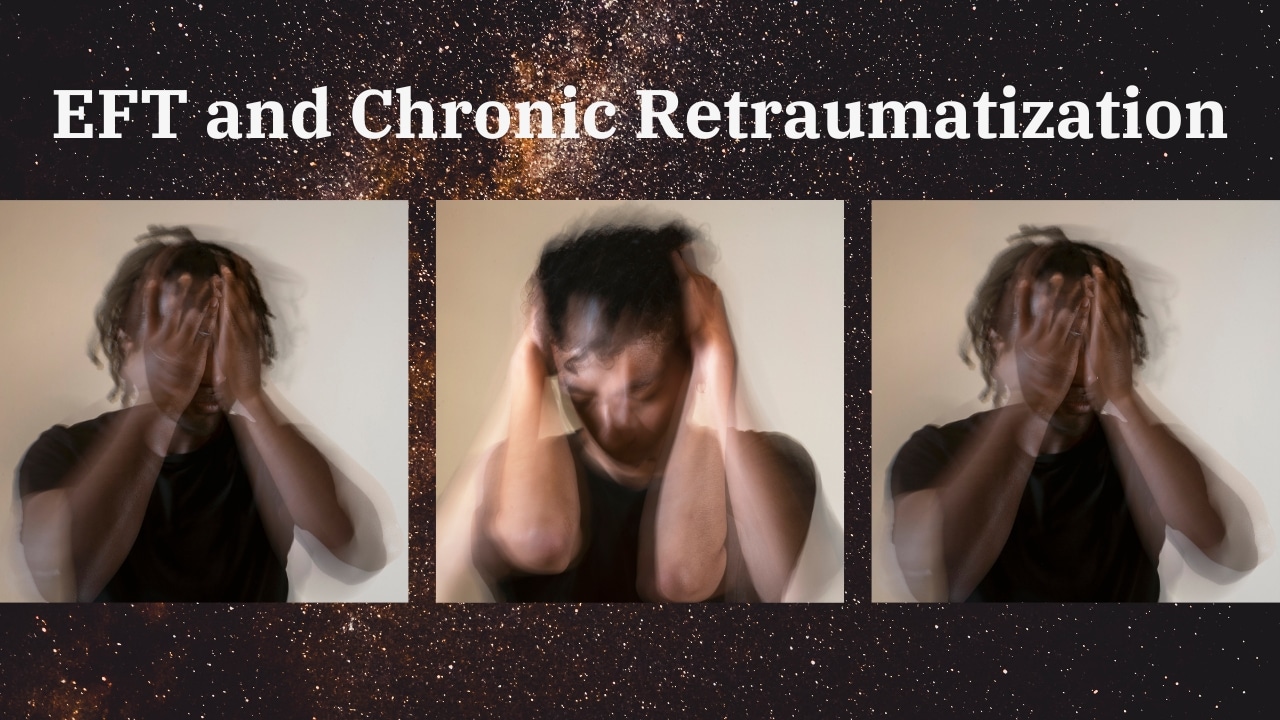
In this video, Deborah talks about the role of chronic retraumatization in healing ourselves and in helping others to heal. This is particularly in relation to her interview with Jessica Ortner on the Tapping World Summit 2020 and her course on Breaking the Cycle of Chronic Financial Instability to Find Peace. Enjoy! World
Hey, guys, it’s Deborah here, and welcome to the New Year. I wanted to take some time today to talk to you about something I’ve been spending a lot of time thinking about, and it’s something you already know, but I want to give it a new twist. So what I want to talk about is something called chronic retraumatization. So generally speaking, when we talk about tapping, we talk about dealing with aspects, or we talk about dealing with traumas, or we talk about dealing with cravings, or we talk about dealing with memories, right? But in this case, I want to talk about the little microtrauma that are happening all day long in our lives.
So for many of you who know, I’m going to be in the typical summit this year, which I’m really excited about. And the topic that they gave me to speak on is breaking the cycle of chronic financial anxiety to find peace, to deal with all of those fears and worries that go along with having financial problems. So often what we’re talking about is we’re talking about manifestation, right? That’s the buzzword of our time is like, oh, let’s manifest a million dollars and manifest, manifest, manifest. But what if all you’re manifesting is a big old pile of bills and a lot of worries and anxiety and an inability to sleep at night, right?
And I think that’s more of us than it is. Those people who are sitting around million dollars, million dollars, never going to think a negative thought. Million dollars, right? So how does one go about breaking that cycle of chronic financial instability, worry, anxiety and so forth? And of course, we need to go in and tap on the lease.
Of course. Got to do that. Lease are the walls that we walk through in order to manifest anything. So if you believe you’re not able, will or worthy to make money, if you believe you’re somehow broken whatever it is that you believe, if you believe money’s, bad, evil, so forth, you are not going to be able to manifest anything because you are blocking yourself subconsciously, if not even consciously. But the bigger issue, I think, is the frequency that we start to feel on the inside.
And I think we can recognize that frequency that chronic that’s going on all the time because it feels like worry or it feels like fear or it feels like anxiety. And what causes that so what causes that, I believe, is chronic retraumatization. So when you are in a bad place financially, as so many people are, capitalism requires that, right? Capitalism requires some people to be on top, some people to be on the bottom. In fact, it requires it’s almost a pyramid scheme, right?
Like, there’s a lot more people in the bottom than there are at the top. That’s how this system that we live in works. So the result is that a lot of people are struggling, people who are working hard, people who care about themselves, who have education, it doesn’t even matter. There’s just a lot of people who are in that bottom tier who are struggling to get by. So what happens is we get into a situation where life is coming at us hard.
There is collection calls. There are bills showing up every day. And then there’s that moment when you open the bill and you think the bill is going to be, or at least you hope the bill is going to be a certain amount. It might be your gas bill. You hope it’s going to be $100 and you’re planning for $100.
And then the gas bill shows up and it’s $400. And that sends this wave of fear and anxiety through us because the consequences of that little tiny problem become huge, because our energy system is now in this state of anxiety and that is generating out into the universe. And that now becomes a point of attraction. And when that’s happening over and over and over throughout the day. Because not only are the outside events that are around us becoming traumatizing, right?
Like getting a bill in the mail that we don’t expect, having an unexpected expense of any store, getting a parking ticket we park at the store or whatever, having to solve a financial problem that you just don’t have a solution to. Those little traumas are coming at us all the time. Somebody, you know, recently at a restaurant here, they went in one day and they told everybody that they were going to lower the amounts of money that they were going to pay them. This is a local fast food restaurant where people make $2.50 an hour here in Panama, right? So they were going to lower it to $2.25 an hour.
So these are people who are barely surviving. And if they want to keep their job, they have to accept a lower income. Can you imagine going to work one day and having somebody tell you that, well, that happened right here on my very street. And you know what happened? I was so proud of them.
They left. They walked out. But a lot of times we don’t have that option. There’s just no way to leave a situation. And so we go into this chronic state of anxiety.
We go into freeze, right? That’s the state where you want to run away or you’re paralyzed. Like me, you would just put the bill on the window sill next to the other bills. I wouldn’t even open them when they came in when I was in that state. So I get it.
So the other thing that starts happening now is our own thoughts become traumatizing, our own chronic worry that chronic worry that you have, like, how am I going to fix this? How am I going to fix this? What’s going to happen? What if I lose my job? What if I take my house?
What if I oh, my God. Oh, my God. Oh, my God. That chronic state of negative thoughts that are going through our head are also traumatizing. So beyond that we have all those beliefs like the things that we should have done, the things that we could have done if only we had done this, if only we had done that.
And then all of the self blame, tons and tons of self blame if only had done this, if only had done that, all of a sudden this would be better. So how do we break that cycle? Well, we have to address chronic retraumatization. And how do we do that? First thing we have to do is recognize it, right?
So if you’re chronically traumatized, for example, let’s say you’re abusive relationship, if you’re in an abusive relationship and you have somebody saying negative things to you all the time or somebody constantly gaslighting you, like making you question your own perceptions, your own thoughts, right? Like if you can get out of that situation that’s the first thing you got to do to stop the retraumatization. You got to get out of the situation. And hopefully, that doesn’t mean crawling into yourself and going into a depression or worse, right? Hopefully, it means having the strength to pick yourself up and take yourself out of the situation.
Same with money. If you have a way to get yourself up out of the situation, do that. A lot of people do not. So then what you have to do is just to start recognizing the tiny little traumas that are coming at you every day. So every time one of those little traumas comes in, if you can tap, tap right there in that moment, I don’t care if you’re just doing finger points, right?
Just do the couple of finger points, get yourself through it or if you can run into the bathroom, whatever, tap. But it has to be consistent tapping, consistent, committed tapping on these little traumas in order to get yourself out of it. Now something else that happens sometimes is we’re getting these constant little traumas that are happening with events that are happening outside of our own life but that are affecting us. For example, I think about a client who had a daughter who was an alcoholic who lived with her, right? So the daughter was coming home drunk every day or the daughter was getting money from her or saying these things or whatever.
And so even though that wasn’t her, the external circumstances were such that she was being retraumatized all the time. So then tap your way through all the little micro traumas until you are finally able to feel comfortable taking yourself out of that situation and not feeling like you have to control it or fix it right, for someone else. And that’s huge. Not easy to do. So the key to chronic retirement is I think number one is recognizing what is happening.
Number two is doing the committed and consistent tapping in the moment, if you can, and then find yourself changing your point of attraction so that even if things come along, like you get a bill in the mail and it costs more and you don’t have the money, at least your internal reaction to that is better. That’s what we’re going for. Okay? Now, as far as watching this in your clients, it’s the same approach, but recognizing that helping them to recognize when it’s chronic retraumatization versus just a little trauma that happened today. Right.
There’s a difference. Little things happen all the time. But when there’s an issue, a single issue that’s retraumatizing, retraumatizing, retraumatizing to focus on that particular thing and work our way through it is really, really important. I hope this is helpful, guys, and I hope you have a wonderful year and getting back to work. And I will talk to you soon.
Join our email list to keep abreast of all things EFT!
© 2022 Center for EFT Studies – onlineEFTcertification.com
